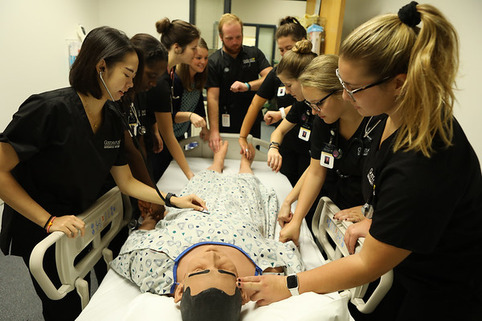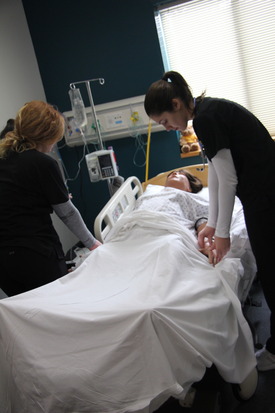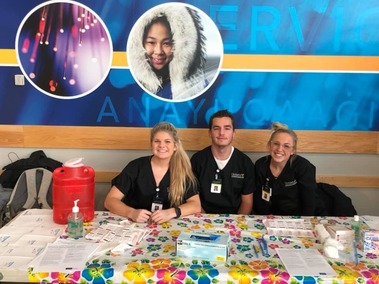Applied Learning ExperiencesGustavus Nursing
Clinical Learning Experiences
Experiential and community engaged learning activities provide students with a hands-on way of integrating theory into practice, strengthening critical thinking, clinical reasoning, innovation, commitment to social justice and lifelong learning, and tolerance for ambiguity. Experiential and community engaged learning in nursing includes clinical experiences and/or observations located in hospitals, clinics, schools, communities, agencies, and patient homes. Clinical partnerships with urban and rural health care agencies range from the heart of Minneapolis/St. Paul to Utqiagvik, Alaska.
Lab and Simulation
Students are provided with a variety of lab and simulation experiences throughout the program. During the first semester of the junior year, students will experience weekly lab activities that allow for growth in assessment and interventional skills as well as preparation for learning experiences in clinical settings.
 Junior nursing students assess pulses on one of the high-fidelity simulation manikins.
Junior nursing students assess pulses on one of the high-fidelity simulation manikins.
The Gustavus Nursing program also utilizes simulated patient care experiences throughout the curriculum. These simulated patient care environments enhance student learning by providing the opportunity for students to build on their assessment skills, critical thinking and clinical reasoning abilities, and practice techniques related to intra- and inter-professional communication and collaboration. Mattson Hall houses three simulation suites equipped with high and medium fidelity mannequins. In addition to the mannequins, the Nursing program utilizes role players from the Theatre Department and the community to simulate standardized patients.
 Nursing students care for a patient in a simulated patient care room.
Nursing students care for a patient in a simulated patient care room.
Off-Campus Studies
Nursing students can participate in the numerous short and long-term off-campus or study-abroad experiences provided by Gustavus Adolphus College. The Center for International and Cultural Education (CICE) has a complete listing of opportunities for students.
- Short-term programs are generally offered during summer term for academic credit. Nursing students can participate in these at any point in their college career. These programs are offered by faculty in many different departments on campus, including Nursing faculty.
- Long-term programs are offered in countries such as Sweden and Malaysia. If students are interested in studying abroad for a full semester, the Gustavus Nursing program recommends the students do this in their sophomore year. Gustavus nursing faculty are available for advising questions.
Gustavus senior nursing students also have the opportunity to participate in a 5 to 6 week precepted clinical immersion experience in Fairbanks and Utqiagvik, Alaska for their Public Health and Maternal-Child clinical experiences. During this clinical immersion experience, students provide health promotion activities for the communities and surrounding villages. While in Alaska, students continue to take Gustavus nursing classes via online classroom course management forum discussions, Lecture Capture, recorded PowerPoints, etc.
 Senior nursing students set up at a public health clinic in Utqiagvik, AK.
Senior nursing students set up at a public health clinic in Utqiagvik, AK.
Internships
Junior nursing students are encouraged to apply for Summer Student Nurse Internships offered by many clinical agencies in Minnesota as well as out of state. These summer internships are competitive and offer exceptional learning experiences that help prepare students for their senior year as well as position students for success in their post-college professional nursing practice. Information on these internships is made available during the fall of Junior year and Gustavus nursing faculty are available to provide guidance and support in the application process.
Student-Faculty Collaborative Research
Gustavus Nursing offers premier opportunities for undergraduate students to engage in nursing research. Students take a research course during the nursing program, where they are able to identify, critique, and create research in the health sciences. In addition, students have the opportunity to be paired with a nursing faculty to conduct an original, independent nursing research project. Students develop, implement, and evaluate their research project. Students also disseminate their project by developing a manuscript for publication or submitting an abstract for a conference presentation. Nursing students have presented at local, regional, and national professional nursing and undergraduate research conferences.